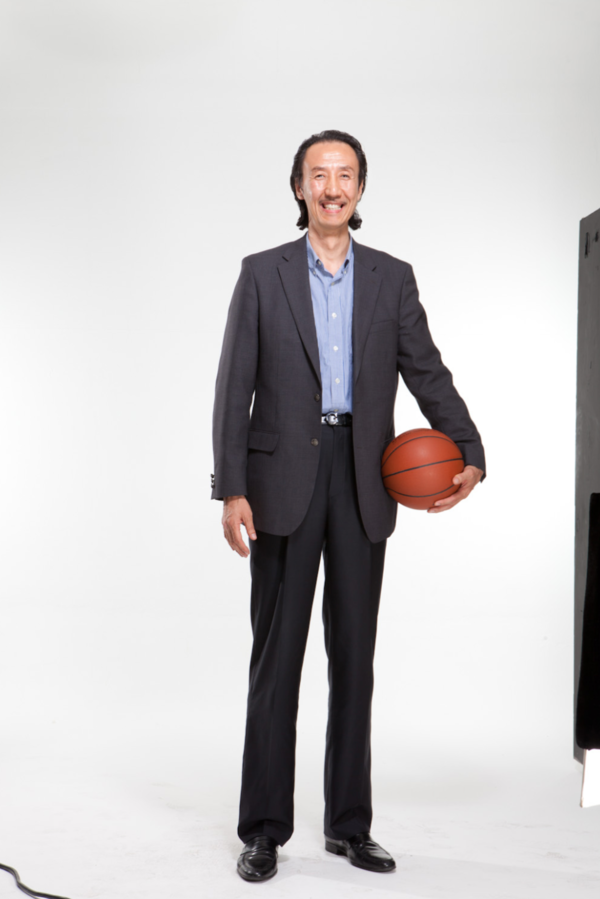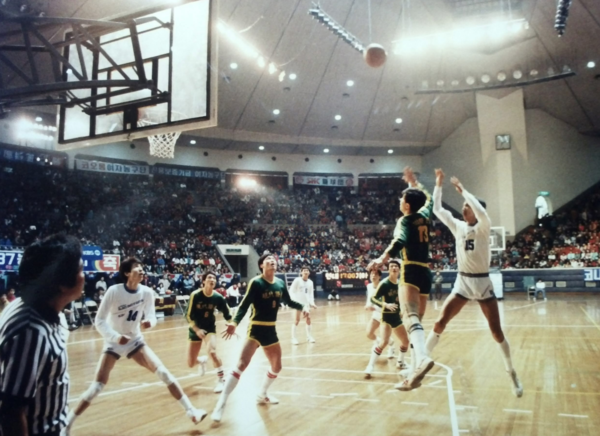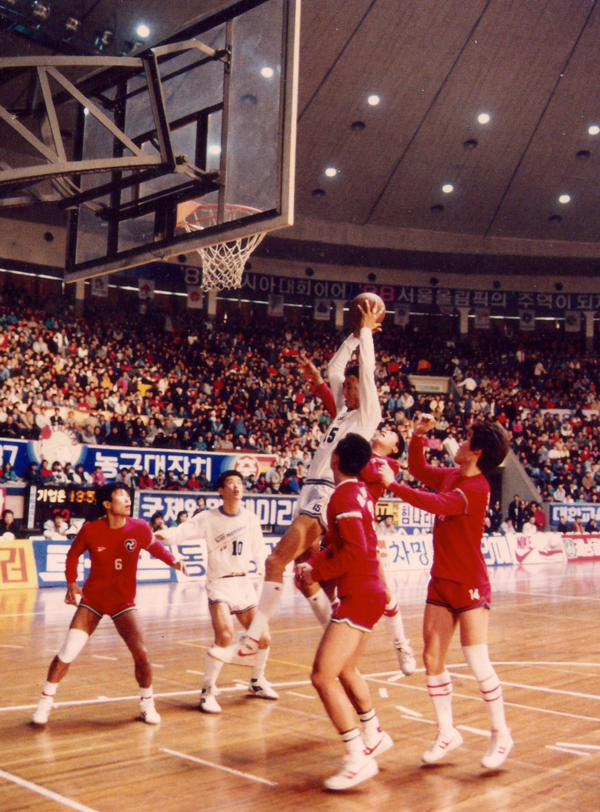
Standing at 205cm tall, Korea's first tall basketball center, Han Ki-bum, won the MVP of the basketball festival in the 1980s and 1990s when college basketball teams had as much popularity as K-pop boy bands. In addition, after entering Chung-Ang University (CAU) in 1982, he opened the era of basketball prosperity at CAU and later worked as the star player who led the Kia Industry to victory. After retirement, he went through struggles as he lost his beloved family due to genetic diseases and recovered from two major heart diseases with the help of The Korea Heart Foundation. After that, he began broadcasting as a 1st generation sports entertainer and established the Incorporated Association Sharing Hope Han Ki-bum [JH1] to sponsor projects for children with heart disease. Let's meet Han Ki-bum, who is living his 2nd life as a representative of the foundation, with CAH.
1. Please introduce yourself to students at CAU and readers who will read this article.
Hello, I'm Han Ki-bum, a basketball player and broadcaster. I entered the school of business administration in 1982 at CAU. It's nice to meet you through CAH.
2. While attending Chung-Ang University, you broke down Yonsei University and Korea University's basketball legacies and won the Championship five times. Do you have any special anecdotes from your college basketball career?
That's right. It means a lot to me. In the beginning, basketball came into Korea through missionaries and the American YMCA, and it was first distributed to Boseong Professional School and Yeonhee Professional School. At the time Yonsei University and Korea University both traded the championship title. No other universities had ever won a championship. However, it can be of great significance that CAU beat Yonsei University and Korea University for the first time in 60 years. At that time, I started winning the championship and achieved my heyday at CAU.

3. In the 1980s and 1990s there was a basketball craze here in Korea. Much of the public were enthusiastic about basketball, and many basketball stars came out of that time. Could you share any memories of that Korean basketball craze?
That's right. It was so popular that I couldn't participate in the graduation ceremony because there was a match on that day. At that time, CAU fans were often with us. Whenever our team went to the game, I remember that a lot of students came and cheered for us happily. Also, our team got lots of fan letters. Since then, there has been a cartoon called “Slam Dunk”, which is about basketball games, and a drama called "The Last Match." With these various environments in place, basketball seems to have gained huge popularity.
4. CAH is curious about the difference between how you felt when you were a player on a university basketball team and at Kia Industrial.
There were a lot of differences. When I was in college, I just had to work out hard as I was taught. I was physically tired, but mentally, I was comfortable because I was a student. But when I graduated from college and went to Kia Industrial, I had to take responsibility. At that time, I got an annual salary, so it was important to work hard, but also had to achieve good results. There was a bit of a burden because I had such a responsibility to produce results. However, it was nice to be able to make money while playing my favorite sport.
5. You drew attention as a tall player. How was it to play as a tall player in basketball?
That's right. It's good for tall players to play basketball. If you are tall, you can easily put the ball in the net. It's much more advantageous than being short.
6. CAH saw in an interview with News Tomato that most of the Big Men start basketball late, and CAH wonders about that!
There are differences by position. Our big men usually play the center position, but there are a lot of simple roles like rebounding, defense, screen, and simple attack, so there is no big problem even if they are short on experience. However, guard position has a lot of roles. They must have a lot of experience because they have to command the overall game and control the strength and weakness of the entire team. Therefore, it's okay for tall players to start a little late. Actually, a lot of Big Men started learning basketball. For example, I started when I was in middle school, but Heo Jae-in and Yoo Jae-hak, who were guards, started when they were in the 3rd and 4thgrades of elementary school.

7. What do you think is the charm of basketball?
First, I think the biggest advantage is that you can do it easily. Soccer needs a large vacant lot and a lot of people, but basketball only needs one or two people, a ball, and a net. You can play easily with your friend, and when you shoot, you can feel satisfied and proud. At the same time, you can fully feel the satisfaction of your position. Another good thing is that if you meet strangers one-on-one or play a two-on-one game, you can quickly increase your affinity and learn to cooperate with each other.
8. Do you remember the last game you played as a player? We'd like to hear the vivid story of your retirement game!
It was in November 1995. After my knee surgery, I played and won a game after getting hit in the ankle with a strong pain reliever I took every six months. So I thought I could go on to a pro team and play for another year or two. At that time, I was forced to retire because even though I had a strong painkiller injection, it hurt even when I walked, let alone play in a game. Eventually, I won my last game. I think the biggest luck of an athlete is to retire after winning the championship. As much as I worked hard with confidence, I won so many championships so I don’t regret it.
9. You have created a basketball class instead of going on to coach. Why did you choose this change?
I was confident I could teach basketball well. I learned a lot from the best coach in Korea. So for the first time, I taught at Guro High School for about a year. The team finished second after the finals, and then I worked at CAU as a coach for about two years. However, some people around me said that being a coach didn’t suit me. There’s a lot to being a coach. For example, I have to scream, scold, and give instructions charismatically. I thought that I was not that strict and firm. I thought that that wasn't my way and that it didn't fit me. However, since basketball suits me the best, I continued to do sponsorship projects through basketball classes.
10. You made a big commitment to change from a charismatic athlete to an entertainer. How did you make this decision?
When I was a coach at CAU, I always trained in camp while teaching students. There was no place for the students to go out and meet their friends, so they only watched TV. At that time, I was invited to appear on various TV shows. So I first started to broadcast with the thought that I should appear on the broadcast for the students and tell them about my experiences. I just started for the students, but now, I love doing the show.
11. Recently, many sports stars are active in the entertainment industry including variety shows. What do you think are the positive impacts these athletes can have on the sports industry?
In the past, it was difficult for athletes to continue working after retirement other than as coaches or directors. However, now, to see many juniors and friends working in various fields just as I did, and I feel so happy and delighted. Retired sports stars can also have a variety of jobs, and it makes me proud to see basketball gaining attention again.
12. You have mentioned that the materials provided by Director Hong Myung-bo, who ran the Hong Myung-bo Scholarship Foundation, were very helpful when you first established the Incorporated Association Sharing Hope Han Ki-bum. If your junior basketball players or acquaintances set up a scholarship foundation, what advice would you give?
First, I am very much in favor of running a scholarship foundation. It's a good action that can have a positive influence on our whole society. I didn't have much experience in operating one at the time, so I called Hong Myung-bo and asked for help. Thankfully, at that time Hong Myung-bo said that he would send some materials through his secretary, even though he was at the Asian Games. Thanks to that, we were able to share experiences and information on the overall basic operations. If a junior wants to start charity work, I recommend doing a lot of preparation before starting. When I first held a charity match, there was a time when a scheduling error caused the match to be delayed by two hours. It was a very dizzying memory, but since a lot of sudden things like this can happen, we need to prepare more thoroughly so that there is no disruption to the operation. What I felt while carrying out sharing activities with the scholarship foundation is that I can vividly experience the feeling of the person receiving the help. We support children with heart disease, so we can see the joy of parents and children up close. That joy is, somehow, not a universal emotion that anyone can feel. If the level of joy exists in the form of a pyramid, I think the joy that comes from sharing is located at the very top of the pyramid. It would be great if the juniors could feel the joy that makes our hearts pound.
13. You are practicing support for children with heart disease, multicultural families, and basketball dreams, including the establishment of your foundation. CAH wonder what your motivations are.
I think I came to do this because of a special occasion. I had a heart disease. It's a disease called Marfan syndrome, which is when the aorta connected to the heart slowly swells. Tall people are most likely to be exposed to this disease, and in fact, my father and younger brother also died from it. I didn't know because I had no symptoms. After an examination, I found out that I had the same disease as they did. I had to get a total of three surgeries, and from the second surgery onwards, support was needed due to financial difficulties. At that time, thankfully I received financial support from the Korea Heart Foundation to undergo the procedure and received the operation. As soon as I first woke up from anesthesia after surgery, the first thought I had was that I owe a debt to society. I came to the thought that “I will have to pay off this debt as I live”, and as a result, I started to support children with heart disease and children from multicultural families.
14. In an interview with News Tomato in 2014, you mentioned that your ultimate dream is to do volunteer work abroad, such as in Africa. In 2019, we confirmed that Incorporated Association Sharing Hope Han Ki-bum conducted the <2019 Youth Overseas Cultural Exchange> in the Philippines with the Gangwon provincial Office of Education. Through those procedures, have you felt that your dream is becoming a reality through this experience?
Yes, I seem to feel that way. One day, we were doing volunteer work with children from multicultural families while conducting public business. At that time, we discovered that children from multicultural families were having problems with a lack of self-esteem. We took them to the Philippines and held a mentoring program with children of the Philippines, and we shared each other's cultures and conducted fun activities such as K-Pop dance competitions there. We found that the self-esteem of the children of both countries increased. It was rewarding to see them supported emotionally as I continue to have these camps. I was always interested in volunteering abroad, such as in Africa or Southeast Asia, and it seems that my dream is being fulfilled through these activities.
15. It seems that the way of sharing has changed due to COVID-19. What are some of your recent sharing activities?
Last year, we were under a lot of restrictions due to COVID-19. When the social distancing phase was eased for a while, I remember that I had a fun basketball game with children by holding a charity basketball tournament to help heart disease patients, and a youth 3-on-3 basketball tournament., which had been held regularly for 10 years before COVID-19.
16. You have been hosting <Hope Basketball with Stars> for 11 years, and we wonder if there is anyone you would like to show special thanks to!
Others often ask the question, “How have you been operating well for such a long time?” First, I would like to express my gratitude to the employees because our foundation is operated by only three of them, who we would be lost without. Also, I would like to bow my head and express my gratitude to the volunteers who come to volunteer every year at my events. Even among those who have come to volunteer, some have been participating for 10 years. Also, I would like to express my sincere thanks to the businesses that have supported the event so that it can be held every year without fail.
17. Have you ever experienced a failure before reaching your current position? If you have, we want to hear how you overcame it.
When I first started this job in 2011, the situation was not as easy as it is now. At that time, there were people who thought it was strange to raise donations from various companies. There were also people who were skeptical about its use. But the more I received such suspicions, the more I think I've developed a sense of challenge to show it off with great success. No matter what anyone says, the thought that I will do my best by working hard at what I want to do has helped me to come this far.
18. What kind of person would you like to be remembered as by future generations?
I want to be remembered as “Daddy Long Leg” like now. At first, this name was very unfamiliar and awkward, but after I started this job, it felt like a word that really fit me in a good way. I'm very thankful that a lot of people are viewing me as a person who spreads good vibes around the society and remember that I was a former basketball player. I thought I would carry this with me for the rest of my life.
19. I wonder what Chung-Ang University is to seniors!
Chung-Ang University is a precious place that has led me to enter society. It also taught me the path ahead, and above all, I think it is the place where I was reborn. While I was in school, I exercised hard, and it was always CAU that trusted and guided me so much.
20. As a senior in life, what advice would you give to people in their 20s who are running towards their dreams?
I want to tell you to be passionate. It is a common saying, but there seems to be nothing more important than having passion. Looking back on what I did when I was in my 20s, I only exercised a lot. At that time, there was really nothing to do but exercise, and for me as an athlete, exercise was all I had. So, what I want to say to today's young people in their 20s is to try many things. I think that it would be good to experience and feel a lot of things. After those experiences, having a single goal and making steady efforts will later serve as a vital foundation when they go out into society.
Han Ki-Bum, a CEO, delivers hope to children through sponsorship and sharing. During the interview, CAH was able to confirm his love for basketball and the social value and preciousness of sharing. We were deeply moved by the way he spoke his words, sometimes cheerfully and sometimes seriously. We applaud him for his new vision of many dreams, such as volunteering abroad and establishing Han Ki-bum's gym. CAH will continue to pay attention to the blueprint of CEO Han Ki-bum!

